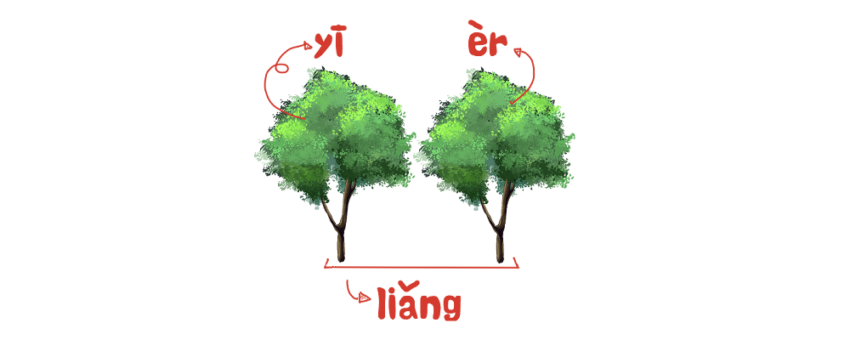The difference between 二 èr and 兩/两 liǎng
In Chinese, both 二 èr and 两 liǎng mean “two.” However, we use them in completely different ways. When using 两 liǎng, it is placed in front of measure words to express quantity, whereas 二 èr is only used when counting numbers. The best way to remember is to use 两 liǎng as “quantity two,” and besides that, just use 二 èr.
2個人2个人 Two people
(Quantity 2 + measure word + people)
2本書2本书 Two books
(Quantity 2 + measure word + books)
2張紙2张纸 Two papers
(Quantity 2 + measure word + papers)
2號2号 The number 2
3分之23分之2 Two-thirds
1,2,3,41,2,3,4 One, two, three, four
2歲2岁 2 years old
12歲12岁 12 years old
Do not use 两 liǎng here because it actually means “quantity twelve.”
When Counting Numbers
| China | Taiwan | |
| 2 | 二 èr | 二 èr |
| 20 | 二十 èrshí | 二十 èrshí |
| 200 | 两百 liǎng bǎi or 二百 èr bǎi | 两百 liǎng bǎi |
| 2000 | 两千 liǎng qiān or 二千 èr qiān | 两千 liǎng qiān |
| 20000 | 两万 liǎng wàn | 两万 liǎng wàn |
| 22222 | 两万二千二百二十二 liǎngwàn èrqiān èrbǎi èrshí èr | 两万两千两百二十二 liǎngwàn liǎngqiān liǎngbǎi èrshí èr |
Note: In Chinese, 10,000 is considered a measure word, similar to how “thousand” and “hundred” are also measure words in English. Therefore, 20,000 is expressed as quantity 2 + measure word wàn. The same idea applies to “thousand” and “hundred.”
I am not sure why China use “èrbǎi” instead of “liǎngbǎi” for 200, but if you know the reason, please share it in the comments.
When Telling the Time:
兩點两点 2:00
十二點十二点 12:00
零二分零二分 00:02
二十二分二十二分 00:22
Use 二 èr to Express “Second”
第二第二 The second
第二個第二个 The second one
第二次第二次 The second time
第二天第二天 The second day
二樓二楼 The second floor
二月 vs 兩個月/两个月
二月二月 is February
兩個月两个月 means ”two months”
FYI
Two can mean ‘double’, ‘twinned’ and ‘again’. It is an auspicious number in Chinese culture because Chinese people believe that ‘good things come in pairs.’ However, the number ‘two’ has an interesting use in different Chinese dialects, but it is mostly negative. 二 èr is used as an adjective to ironically describe those who are arrogant or thoughtless. So when someone calls you 二百五 Èrbǎi wǔ, an idiot or 二愣子 èr lèngzi, a stupid person, it is not a compliment.
二 and 兩


